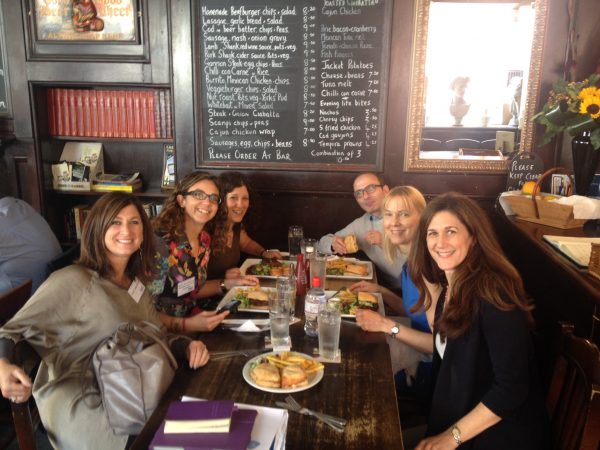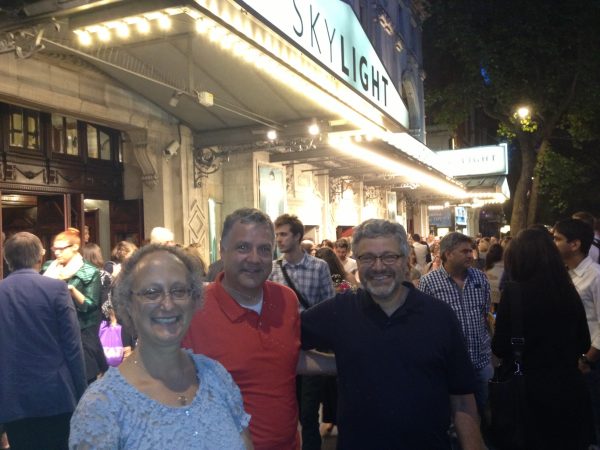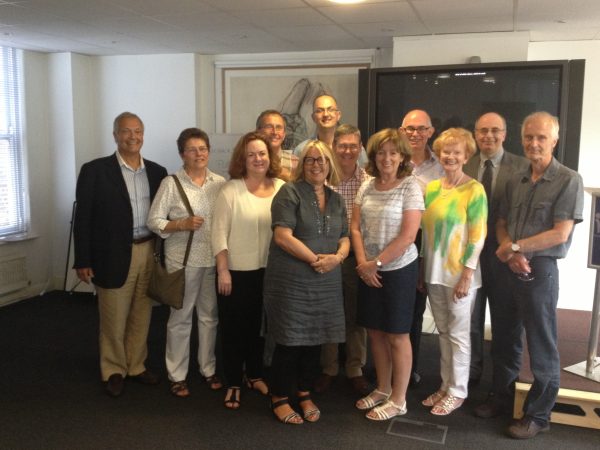David Scharff and Janine Wanlass led a collaboration with TCCR to join in teaching and group-leading at the TCCR 2014 summer school “When a Twosome Becomes a Threesome: Developing and Advancing Skills in Couple Therapy” held at the Tavistock Centre for Couple Relationships in London, England. David and Janine were joined by Jill Scharff and Caroline Sehon of IPI’s Child, Couple and Family program faculty. Participants in the summer school included IPI members Frank Barone, Sam Filomena, Karen Greenberg, Jenina Lepard, Carla Trusty-Smith, and Joseph Weber, and IPI couple therapy videoconference participants Matitiaou Schliachter (from Israel) and Tertia Myers (from South Africa).
In the advancing skills track, Janine and Caroline related their presentations to the summer school theme “When a Twosome Becomes a Threesome” whereas David showed a video on projective identification. Others presenting from TCCR included teachers who have participated at IPI – Andrew Balfour, Pierre Cachia, Chris Clulow, David Hewison, Damian McCann, and Mary Morgan. Twice a day there were small discussion groups that we co-led with our TCCR partners. Janine was partnered with Liz Hamlin, Jill with Patsy Rhys, David with Viveka Nyberg, and Caroline with David Hewison as co-leaders of these groups. These were clinical case discussion groups to which the co-leaders consulted, not affective learning groups, as we have at IPI.
The group led by Janine and Liz, which was in the developing track, entered into discussion of clinical cases, where participants began to consider how couple work differs from individual work, the complicated transferences that emerge in couple work, and points of impasse in conducting couple treatment. Janine found that working with Liz and blending leadership styles from IPI and TCCR created a productive atmosphere for students to explore couple dynamics.
The groups led by David, Jill and Caroline in the advancing skills group were faced with a late change in the task. Our groups were to apply a modified version of the “Tuckett model” to process notes presented by each of the participants on an ongoing couple therapy (Tuckett et al. 2008). The original Tuckett model focuses on one case intensely over 2 days. Under the leadership of David Hewison, Head of Research at TCCR, the Tuckett model was modified to focus intently on 5 aspects of 6 cases over the 4 days of the summer school, and of course it applied to couple therapy process notes, not psychoanalysis. The group carried out the task by listening to a therapist’s process notes from a couple therapy, and without further input initially from the therapist, and categorizing what had happened in answer to 5 key questions (adapted from Tuckett) about the case material that they presented. These questions comprised (a) What does the couple therapist listen to, as evidenced by the therapist’s response? (b) How does the clinician envisage the clinical situation? (c) What is the couple therapist’s model of change? (d) What does the clinician think will further the clinical process? (e) What is in the way of the couple realizing a healthier relationship? At times, some participants resisted this challenging task, feeling frustrated that they didn’t get the “supervision” that they came for, and missing the freedom to say whatever came to mind. At other moments, students recognized the value of learning from a vantage point that differed from the experience-near, affective learning model. Many students left feeling quite intrigued by the model, and reported that it sharpened their thinking about diverse elements of theory and technique and how these are influenced by the interplay of culture, therapist training, and other factors.
Enthusiastic participants wrote about their experiences: “My associations to various lectures and discussions continue both in sessions and in other parts of my life. One concept that crystalized for me was the notion that couples have a ‘Third Position’ which involves the relational container and how this position can be greatly affected by others brought into it. I’m fascinated by the therapist’s action to enter and affect that space, and work with projective elements in it with the goal of enhancing its holding function for the couple” (Frank Barone, USA).
“The most rewarding part of the TCCR Summer School was to finally meet the faces from the videoconferencing in the flesh. Feeling quite isolated in South Africa at times, it was wonderful to have a sense of being part of an international community of couple therapists. The small group/case presentations were the most challenging part of the Summer School and it proved hard to stick to thinking about what the therapist was thinking and intending. All in all it was a very enriching experience” (Tertia Myers, SA).
“One highlight from the TCCR experience for me included the multicultural perspectives evident in how therapists work with their cultural context and dynamics. South Africa, Australia, Israel, Italy, England, US were all represented in our small group!I enjoyed exposure to the Tuckett model as a different way to think together about various therapy approaches within a psychoanalytic spectrum, and I appreciated the space at the conclusion of the week to consider other applications of the model based upon what did and didn’t work as well this time around. It was fun to make new friends from around the globe, to see the TCCR in operation and meet in person those with whom I have studied on video conference for many years!” Carla Trusty-Smith.

“I thoroughly enjoyed sharing the struggles and satisfaction of applying psychodynamic principles to couples work. A big surprise for me was how the concept of projective identification became vividly animated when I experienced it applied to couples work. I began to learn to help partners untangle and reclaim their best and/or most painful parts of themselves in order to provide fertile ground for genuine intimacy to grow in their relationship” (Joseph Weber).
On a social yet serious note, the whole conference decamped to the theatre to enjoy Skylight, the David Hare play about the rekindling of a relationship between an older widowed man and his former live-in lover, played by Bill Nyghe and Carey Mulligan. During the intermission, because the performance was being filmed, we were privileged to hear a live interview with the playwright by Emma Freud (Freud’s great-granddaughter) the host of National Theatre Live. In the conference the next day, a spirited discussion evolved concerning the echoes of oedipal triumph and guilt, dependency and independence, and the clash of values between the wealthy and those (like therapists) committed to service.

At the close of the conference, TCCR held a book-launch reception for the newly released Karnac book Psychoanalytic Couple Therapy: Foundations of Theory and Practice, edited by David and Jill Scharff with the collaboration of David Hewison, Christel Buss-Twachtmann and Janine Wanlass. The book, a co-operative compendium on how to work with couples in psychoanalytic psychotherapy, features chapters by those at IPI and TCCR who have given presentations and discussions in the videoconference course on couple therapy organized by David and Janine. Professor Brett Kahr introduced Psychoanalytic Couple Therapy as “the most comprehensive” book on the topic, “the most rigorous, and the most readable, and written, moreover, with the profundity of understanding offered by the psychoanalytical lens.” He predicted that it would “become the standard textbook in our field.” Over a glass of wine and a few tasty appetizers, we savored the culmination of our efforts, and expressed our gratitude for the fruitful collaboration of TCCR and IPI.

We all enjoyed our co-leading pairs, and made time to talk together after our groups. We learned again about the privilege of a good environment for the learning task and the importance of processing our experiences with our groups. During the summer institute, several conference participants, some of whom had not previously encountered IPI, expressed an interest in joining the IPI-TCCR couple therapy video-seminar series. David and Janine hope to create an equally compelling summer institute on couple and family therapy in Greece on the island of Rhodes next summer in partnership with Anastasia Tsamparli of the University of the Aegean.
Tuckett, D. et al. (2008). Psychoanalysis Comparable and Incomparable. London: Routledge.

